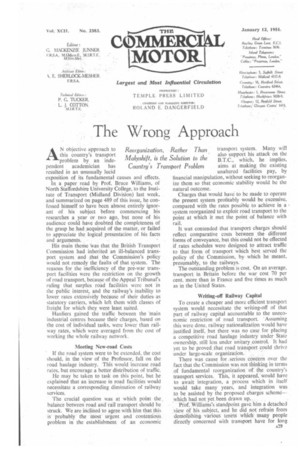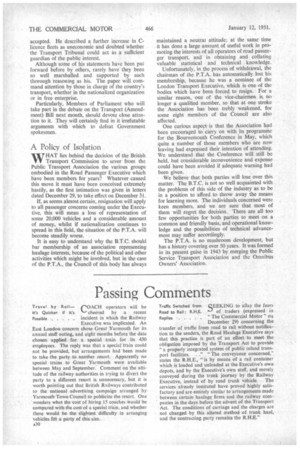The Wrong Approach
Page 31

Page 32

If you've noticed an error in this article please click here to report it so we can fix it.
Reorganization, Rather Than Makeshift, is the Solution to the Country's Tra nsport Problem
AN objective approach to this country's transport problem by an independent academician has resulted in an unusually lucid exposition of its fundamental causes and effects.
In a paper read by Prof. Bruce Williams, of North Staffordshire University College, to the Institute of Transport (Midland Division) last week, and summarized on page 489 of this issue, he confessed himself to have been almost entirely ignorant of his subject before commencing his researches a year or two ago, but none of his audience could have doubted the completeness of the grasp he had _acquired of the matter, or failed to appreciate the logical presentation of his facts and arguments.
His main theme Was that the British Transport Commission had inherited an ill-balanced transport system and that the Commission's policy would not remedy the faults of that system. The reasons for the inefficiency of the pre-war transport facilities were the restriction on the growth of road transport, because of the Appeal Tribunal's ruling that surplus road facilities were not in the public interest, and the railway's inability to Tower rates extensively because of their duties, as statutory carriers, which left them with classes of freight for which they were least suited.
Hauliers gained the traffic between the -main industrial centres because their charges, based on the cost of individual tasks, were lower than railway rates, which were averaged from the cost of working the whole railway network.
Meeting New-road Costs If the road system were to be extended, the cost should, in the view of the Professor, fall on the road haulage industry. This would increase road rates, but encourage a better distribution of traffic.
He may be taken to task on this point, but he explained that an increase in road facilities would necessitate a corresponding diminution of railway services.
The crucial question was at which point the , balance between road andrail transport should he struck. We are inclined to agree with him that this is probably the inost urgent and contentious problem in the establishment of an economic transport system. Many will also support his attack on the B.T.C., which, he implies. aims at making the existing unaltered facilities pay, by financial manipulation, without seeking to reorganize them so that economic stability would be the natural outcome.
Charges that would have to be made to operate the present system profitably would be excessive, compared with the rates possible to achieve in a • system reorganized to exploit road transport to the point at which it met the point of balance with rail.
It was contended that transport charges should reflect comparative costs between the different forms of conveyance, but this could not be effected if rates schedules were designed to attract traffic to that form of transport which best served the policy of the Commission, by which he meant, presumably, to the railways.
The outstanding problem is cost. On an average, transport in Britain before the war cost 70 per cent. more than in France and five times as much as in the United States.
Writing-off Railway Capital To create a cheaper and more efficient transport system would necessitate the writing-off of that part of railway capital accountable to the uneconomic restriction of road transport. "Assuming this were done, railway nationalization would have • justified itself, but there was no case for placing a competitive road haulage industry under State ownership, still less under unitary _control. It had yet to be proved, that road transport could thrive under large-scale ,organization.
There was cause for .serious concern over the fact that the Commission was not thinking in terms of fundamental reorganization of the country's transport services. This, it appeared, would have to await integration, a process which in itself would take many years, and integration was to be assisted by the proposed charges schema-,which had not yet .been drawn up.
Prof. Williams's standpoint gave him a detached _view of his subject, and he did not refrain from demolishing variOns tenets which many people directly concerned with transport have for long accepted. He described a further increase in Clicence fleets as uneconomic and doubted whether the Transport Tribunal could act as a sufficient guardian of the public interest. Although some of his statements have been put forward before by others, rarely have they been so well marshalled and supported by such thorough reasoning as his. The paper will command attention by those in charge of the country's transport, whether in the nationalized organization or in free enterprise. Particularly. Members of Parliament who will take part in the debate on the Transport (Amendment) Bill next month, should devote close attention to it. They will certainly find in it irrefutable arguments with which to defeat Government spokesmen.
A Policy of Isolation WHAT lies behind the decision of the British Transport Commission to sever from the Public Transport Association the various groups embodied in the Road Passenger Executive which have been members for years? Whatever caused this move it must have been conceived ex1remely hastily, as the first intimation was given in letters dated December 29, to take effect on December 31. If, as seems almost certain, resignation will apply to all passenger concerns coming under the Executive, this will mean a loss of representation of some 20,000 vehicles and a considerable amount of money, whilst if nationalization continues to spread in this field, the situation of the P.T.A. will become steadily worse. It is easy to understand why the B.T.C. should bar membership of an association representing haulage interests, because of the political and other activities which might be involved, but in the case of the P.T.A., the Council of this body has always maintained a neutral attitude; at the same time it has done a large amount of useful work in promoting the interests of all operators of road passenger transport, and in obtaining and collating valuable statistical and technical knowledge. Unfortunately, in the process of withdrawal, the chairman of the P.T.A. has automatically lost his membership, because he was a nominee of the London Transport Executive, which is one of the bodies which have been forced to resign. For a similar reason, one of the vice-chairmen is, no longer a qualified member, so that at one stroke the Association has been trebly weakened, for some eight members of the Council are also affected. One curious aspect is that the Association had been encouraged to carry on with its programme for the Bournemouth Conference in May, which quite a number of those members who are now leaving had expressed their intention of attending. We understand that the Conference will still be held, but considerable inconvenience and expense could have been avoided if adequate warning had been given. • We believe that both parties will lose over this matter. The B.T.C. is not so well acquainted with the problems of this side of the industry as to be in a position to afford to throw away the means for learning more. The individuals concerned were keen members, and we are sure that most of them will regret the decision. There are all too few opportunities for both parties to meet on a common and friendly basis, and operational knowledge and the possibilities of technical advancement may suffer accordingly. The P.T.A. is no mushroom development, but has a history covering over 50 years. It was formed in its present guise in 1943 by merging the Public Service Transport Association and the Omnibus Owners' Association.




































































































